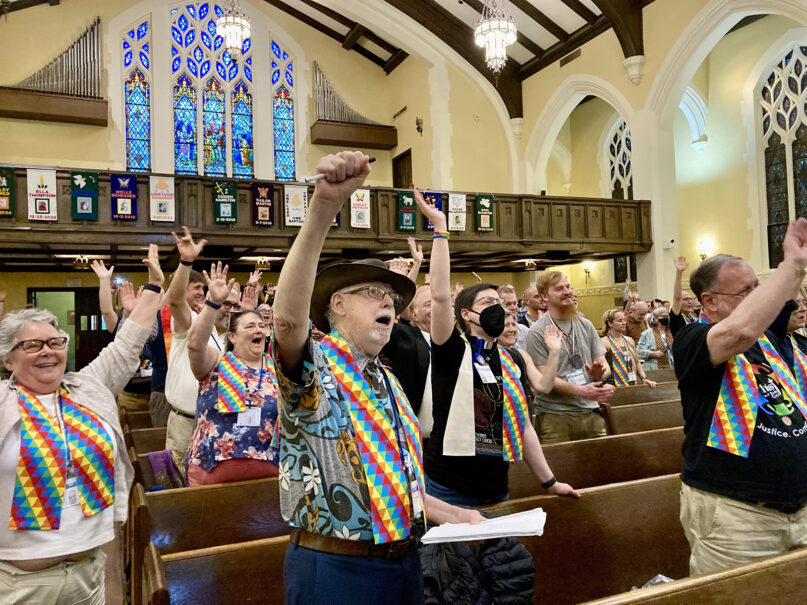(RNS) — The year’s news in religion was dominated by a war already in progress on Jan. 1 between Hamas and Israel. Though not at root a religious war, as the months went by the conflict supercharged American-Jewish divisions over Israel, fractured some Jewish-Muslim alliances and made antisemitism on campus a rallying cry for the right. It also exposed, in the view of many who sympathized with the Palestinians, new depths of Islamophobia.
The top religion stories also reprised familiar themes of the 2016-2020 Trump administration, as Donald Trump’s third presidential campaign returned him to the White House. We also saw the end of a three-year-long Vatican synod and the opening of a Hindu temple three decades in the making.
But if several of this year’s biggest stories were holdovers from previous years, there were, as ever, surprises nobody could have predicted. Here are the developments in faith, politics and culture that defined 2024 for us at RNS:
1. Israel-Hamas war’s spiritual reckoning

People organized by Halachic Left demonstrate against the Israel-Hamas war outside the 96th Street subway station on Tisha B’av, Aug. 13, 2024, in New York City. (Photo by Gili Getz)
As Palestinian casualties in the war that began with Hamas’ murderous Oct. 7, 2023, raid on southern Israel passed 48,000 in Gaza, the fighting caused spiritual reckoning far from the combat. Many American Jews felt deeply that critiques of Israel’s actions on campus amounted to antisemitism. The war also gave voice to growing ranks of anti-Zionists on the left. By year’s end, campus protesters, some of whom had sought solace in Jewish sabbath and Christian Communion celebrations, had largely dispersed, while in Israel and the occupied territories, Jewish parents mourned children who died as hostages in Gaza. Muslims, Christians and some Jews lamented that the world remained indifferent to the Palestinian plight.
2. Trump returns

Republican presidential nominee former President Donald Trump arrives at a campaign rally at Atlanta’s McCamish Pavilion, Oct. 28, 2024. (AP Photo/Julia Demaree Nikhinson)
The reelection of Donald Trump braided so many narratives of politics and religion together it’s difficult to know where the strands begin or end: Historically Catholic and Democratic Latino voters showed their increasing evangelical Christian and Republican leanings at the ballot box; white evangelicals, despite only muted coordination with Trump compared to 2016, and looking past the GOP’s more moderate stance on abortion, overwhelmingly supported Trump in November; Muslims, alienated by President Biden’s backing of Israel in the Gaza war, went for Trump in larger numbers or voted for third-party candidates.
After the vote, some Muslims and liberal Christians worried that Christian nationalist elements in the new administration will restrict religious freedom and persecute migrants. They assessed their hopes of reviving opposition tactics from five years ago.
3. The Synod on Synodality stresses dialogue over doctrinal change

Participants attend a session of the 16th General Assembly of the Synod of Bishops at the Paul VI Hall at the Vatican, Oct. 7, 2024. (AP Photo/Andrew Medichini)
Pope Francis’ 2021 call for Catholics in every diocese around the world to gather to register their concerns and dreams for a future church — a process called synodality — raised hopes of a completion of Vatican II, in which women’s roles would be expanded, possibly even to ordination as deacons. By its end in October 2024, controversial topics raised in the listening sessions had been relegated to special committees. The final report of the synod called for lay people to take a more active role in their dioceses. No reform suggested by the synod delegates required changes to doctrine or canon law.
4. Indian Prime Minister Modi dedicates massive Hindu temple in Lord Ram’s birthplace

A general view of the audience during the opening of the Ram Mandir, a temple dedicated to Hindu deity Lord Ram, in Ayodhya, India, Jan. 22, 2024. (AP Photo/Rajesh Kumar Singh)
The third-largest Hindu place of worship in the world opened in January in Ayodhya, in northern India, said to be the deity’s birthplace. The spectacular monument has inspired Hindus the world over, but, built on the site of a 16th-century mosque torn down by a Hindu mob in 1992, it represents for many members of India’s minority Muslim faith a consummation of Prime Minister Narendra Modi’s Hindu nationalist program. In New York, a parade float carrying a model of the temple caused controversy in the run-up to August’s India Day parade.
5. United Methodist Church overturns its ban on openly LGBTQ+ clergy and same-sex marriage

First United Methodist Church in Charlotte, N.C., hosted hundreds of LGBTQ+ people and their allies May 1, 2024, for a celebratory sing-along after the United Methodist General Conference lifted a ban on gay ordination. (RNS photos/Yonat Shimron)
After years of wrangling over LGBTQ+ inclusion, the United Methodist Church, the second largest denomination in the U.S., concluded its General Conference in June by repealing a 52-year-old declaration that the practice of homosexuality is “incompatible with Christian teaching” and canceling church laws banning ordination of gay people and marriage for same-sex couples. At the same time, the body voted to restructure the worldwide denomination to create new regions and tailor their own local customs and traditions and church rules. The discord within the church is not over, however, as overseas United Methodists continue to sort themselves — with sometimes violent results.
6. States require teaching about Christianity in classrooms
Ryan Walters, elected Oklahoma’s superintendent of schools in 2022 after running on a platform of fighting “woke ideology” in the state’s public school system, is facing lawsuits after requiring the Bible to be taught in schools “as an appropriate study of history, civilization, ethics, comparative religion.” He purchased 500 copies of a Christian nationalist Bible promoted by President-elect Donald Trump. Walters further required schools to show a video in which he announced his new Department of Religious Freedom and Patriotism and in December mandated additional mentions of Christianity in the state’s social studies standards.
In Louisiana, a law passed in June required all schools receiving public funding to post a version of the Ten Commandments in their classrooms. In November, after a U.S. district court judge blocked execution of the law, Louisiana’s attorney general said the state would appeal.
7. Catholic diocesan hermit approved by Kentucky bishop comes out as transgender

Brother Christian Matson, shown on May 10, 2024, in Pikeville, Kentucky, is a Catholic diocesan hermit. (Photo by Jennifer Hart Yonts)
Brother Christian Matson, believed to be the first openly transgender person in his position in the Catholic Church, announced his status in May, offering his story as indicative of the often difficult path for trans Catholics. Matson, who had converted to Catholicism in 2010, had long sought a way to fulfill a vocation in the church, and Bishop John Stowe of Lexington, noting that Matson was not seeking ordination, called the hermit’s spiritual journey “consistent with the calling of that particular vocation.” Although Matson lives quietly in a small Appalachian town, his revelation struck a chord at a time when transgender Catholics have both been welcomed by Pope Francis and felt ostracized by the pope’s stated views on gender theory.
8. Declining churches look to repurpose their real estate
As church attendance declines, thousands of barely surviving houses of worship are facing the question of what to do with their real estate and how to continue to serve their communities in new ways. Church closures have reached a point that congregants and pastors are seeking professional help, attending gatherings such as September’s Future of Church Property conference, organized by Princeton Theological Seminary, where real estate lawyers and nonprofit developers counsel attendees on strategies to meet local needs or tap new revenue. Other churches have turned to groups such as RootedGood, a nonprofit that works with churches on how to repurpose their spaces.
9. After devastating fire, Notre Dame reopens

Guests watch clergy members leaving the inaugural Mass at Notre Dame Cathedral, hosting its first Mass since the catastrophic fire in 2019, Sunday, Dec. 8, 2024 in Paris. (AP Photo/Alessandra Tarantino, Pool)
Defying those who said that Paris’ historic cathedral should reopen as a cultural center, not a church, Notre Dame opened its doors in December with a festive ceremony attended by world leaders, only barely missing what seemed like an impossible five-year timeline of rebuilding. A phoenix with flaming feathers was installed atop the spire in December, marking the cathedral’s rise from the ashes.
10. Archbishop of Canterbury resigns over handling of abuse

Archbishop of Canterbury Justin Welby speaks at an interreligious meeting in Rome on Oct. 6, 2021. (AP Photo/Gregorio Borgia, File)
His reputation tarnished by an investigation into the Church of England’s response to allegations of abuse by a prominent lay member, Justin Welby announced in November that he would step down as archbishop of Canterbury, traditionally “first among equals” of all the primates in the global Anglican Communion. He followed his resignation with a farewell speech in the House of Lords that only worsened his standing with the public. The scandal gave momentum to those calling for the United Kingdom’s bishops to no longer hold seats in the Lords, and calls for the church to give up some of its influence in the Communion.
2024 has been quite a year. And throughout it, RNS has been committed to shining a light on how religion plays a role in so many issues of the day, from immigration to politics to education – while also highlighting how faith and faith leaders can unite, serve, and heal. If you learned something from this story, or from one of the hundreds of other articles and opinion pieces we’ve published in 2024, will you commit to helping us produce more in 2025? Until midnight on December 31, every dollar you give to our nonprofit newsroom will be DOUBLED by generous gifts from other readers. Thank you for visiting our website!
Deborah Caldwell, CEO and Publisher

